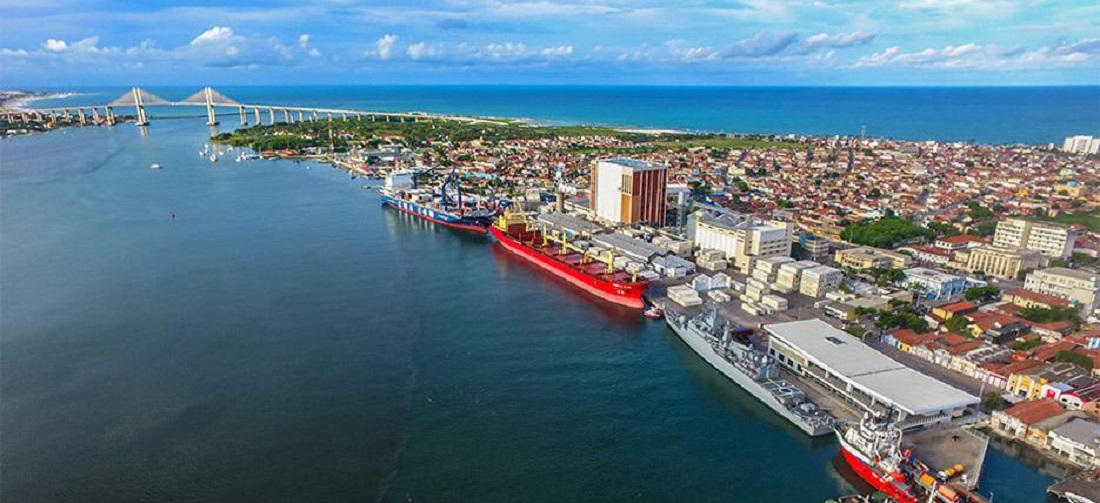
Drop in Brazil’s Port of Natal activities worries state productive sector
Jun, 25, 2024 Posted by Gabriel MalheirosWeek 202427
Since CMA CGM ceased its operations at the Port of Natal, the steady decline in cargo throughput has raised concerns among the state’s Federation of Commerce of Goods, Services, and Tourism (Fecomércio-RN) and Agriculture and Livestock (Faern). According to press agency TRIBUNA DO NORTE, port throughput in the first four months of this year dropped by 48.3% compared to the same period last year. This movement continues the downward trend observed in 2023 when total operations dropped by 32.6% compared to the previous year.
Fecomércio-RN warns that inadequate infrastructure is putting the state at a competitive disadvantage compared to established ports like Suape in Pernambuco and Pecém in Ceará. “One of the main problems we face lies in infrastructure, both of the terminal itself and in terms of access, specifically concerning the draft of the ships and the defense structures on the Newton Navarro Bridge. Another issue is of a market nature, as we face competition from two large ports,” commented Marcelo Queiroz, president of Fecomércio-RN.
José Vieira, president of Faern, emphasizes that Rio Grande do Norte is missing a critical opportunity in fruit exports. “The Port of Natal, by its nature, is dedicated to fruit trade. The result is this: there is no surprise. When CMA CGM leaves the state due to lack of structure and no other company comes to fill the gap, this is the outcome,” he states.
The decline in activity at the Port of Natal is primarily due to inadequate infrastructure. The lack of proper dredging, which is essential for maintaining the depth necessary for navigation, and the absence of protective defenses on the bridge deter large companies from operating in Rio Grande do Norte. This was the reason CMA CGM, the port’s largest operator, relocated its operations to the Port of Mucuripe in Ceará.
Fecomércio-RN advocates for improving the terminal’s infrastructure to facilitate cabotage, the transport of cargo between domestic ports. “Cultivating an adequate structure would be fundamental as it would allow cabotage navigation, which Fecomércio-RN has always seen as a way to enhance the state’s competitiveness. One of the bottlenecks our companies face is the high cost of freight by air or road, whether for import or export,” says Queiroz.
Data from the National Waterborne Transport Agency (Antaq) show that between January and April this year, the Port of Natal had a 113,583 tonnes cargo throughput. In 2023, during the same period, the port saw 219,866 tonnes. Of the 113,000 tonnes handled this year, 82.9% were inbound, mainly wheat, while only 17.1% were outbound, including sugar and small shipments of melons, watermelons, and papayas.
Port activities up 5.92% nationwide
In contrast to the decline at the Port of Natal, cargo throughput in Brazilian ports grew by 5.92% in the first four months of this year compared to the same period last year, reaching 413.5 million tonnes. According to Antaq, among agricultural products, soybeans saw a 4% increase to 53.7 million tonnes, sugar surged by 72% to 9.2 million tonnes, and coffee jumped by 80% to 1.1 million tonnes.
Source: Tribuna do Norte
Click here to read the original news piece: https://tribunadonorte.com.br/economia/queda-de-atividade-no-porto-de-natal-preocupa-setor-produtivo/
-
Grains
Mar, 12, 2025
0
São Luís Port Terminal Cleared to Export Corn to China
-
Other Cargo
Oct, 24, 2023
0
Poor performance of Uruguay’s ovine sector, hit by low international prices
-
Economy
Mar, 07, 2022
0
Ukraine’s president calls for boycott of Russian products
-
Ports and Terminals
Jun, 07, 2023
0
DP World invites you to TOC Europe

